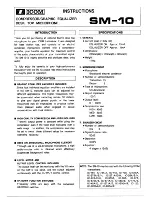
Working with Clusters and Match Rules
Use the
Security > Certificate
tab to select a default SSL certificate that clients will use to validate a
connection to an HTTPS cluster (a cluster certificate).
Default Certificate
Use the drop down list to select a default SSL certificate that clients will use to val-
idate a connection to this HTTPS cluster.
Client CA
The
Client CA
is used to authenticate the SSL client certificate if the
Require
Client Certificate
option is enabled or if a
CRL
selection is made.
Use the drop down list to select the name of a client certificate authority
(CA).This is the certificate of an authority in a network that issues and manages
security credentials and public keys for message encryption. It must be
uploaded to Equalizer's certificated store. As part of a public key infrastructure,
a CA checks with a registration authority to verify information provided by the
requester of a digital certificate. If the registration authority verifies the
requester's information, the CA can then issue a certificate. The certificate usu-
ally includes the owner's public key, the expiration date of the certificate, the
owner's name, and other information about the public key owner.
CRL
A Certificate Revocation List
CRL
is used to check if the SSL certificates provided
by the SSL client during the SSL handshake are not in the CRL list. It requires the
Client CA
to be specified.
Use the drop down list to select a
CRL
.
Validation Depth
The depth to which certificate checking is done on the client certificate chain.
The default of 2 indicates that the client certificate (level 0) and two levels above
it (levels 1 and 2) are checked; any certificates above level 2 in the chain are
ignored. You should only need to increase this value if the Certificate Authority
that issued your certificate provided you with more than 2 chained certificates in
addition to your client certificate.
Flags
Push Client Certificate
Enabling this option sends the client certificate to the back-end server.
Require Client Certificate
Enabling this option requires that client's present certificates. The client
CA, if configured, validates the SSL certificate presented by the SSL client.
Strict CRL Chain
This option requires the
Client CA
and
CRL
to be specified. If it is enabled
then it ensures that none of the certificates in the certificate chain of the
SSL client certificate are in the
CRL
. If the client
CA
and
CRL
are specified,
yet this option is not enabled, then only the last certificate in the certificate
chain of the SSL client certificate is checked against the specified
CRL
.
348
Copyright © 2014 Coyote Point Systems, A Subsidiary of Fortinet, Inc.
Summary of Contents for Equalizer GX Series
Page 18: ......
Page 32: ...Overview 32 Copyright 2014 Coyote Point Systems A Subsidiary of Fortinet Inc ...
Page 42: ......
Page 52: ......
Page 64: ......
Page 72: ......
Page 76: ......
Page 228: ......
Page 238: ......
Page 476: ......
Page 492: ......
Page 530: ......
Page 614: ......
Page 626: ......
Page 638: ......
Page 678: ......
Page 732: ...Using SNMP Traps 732 Copyright 2014 Coyote Point Systems A Subsidiary of Fortinet Inc ...
Page 754: ......
Page 790: ......
Page 804: ......
Page 842: ......
Page 866: ......
















































